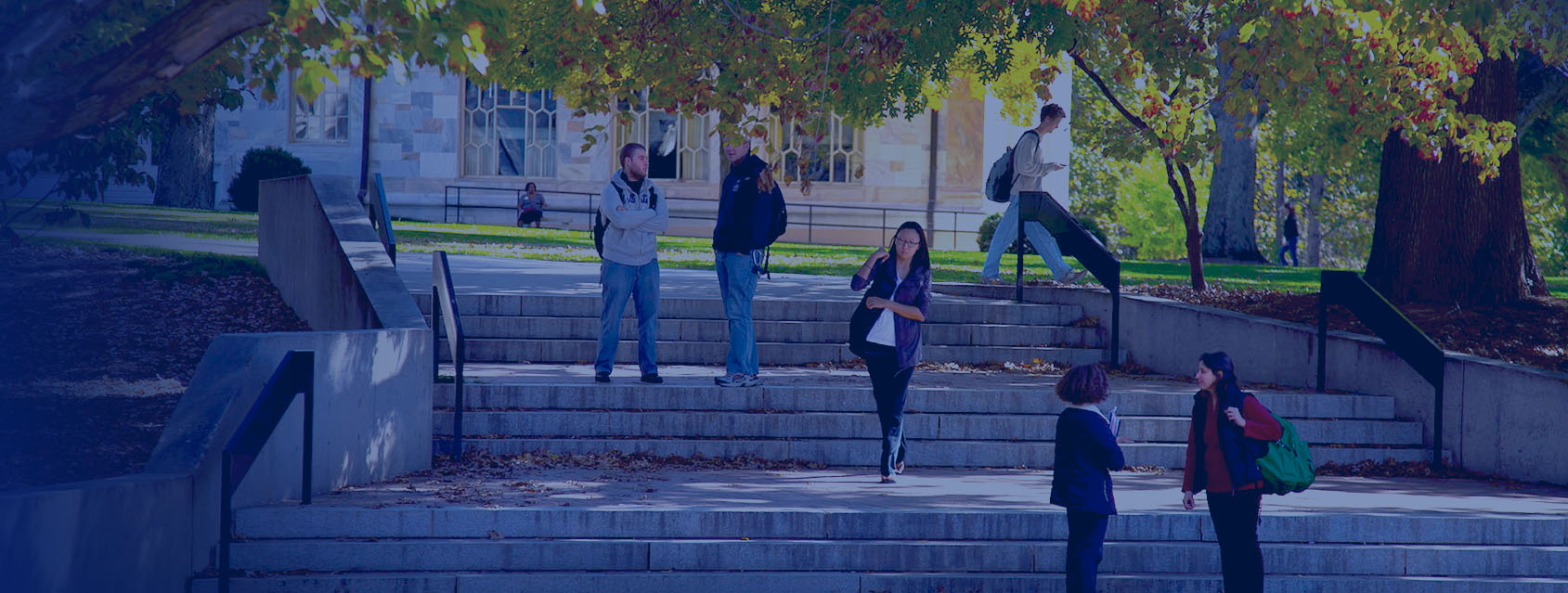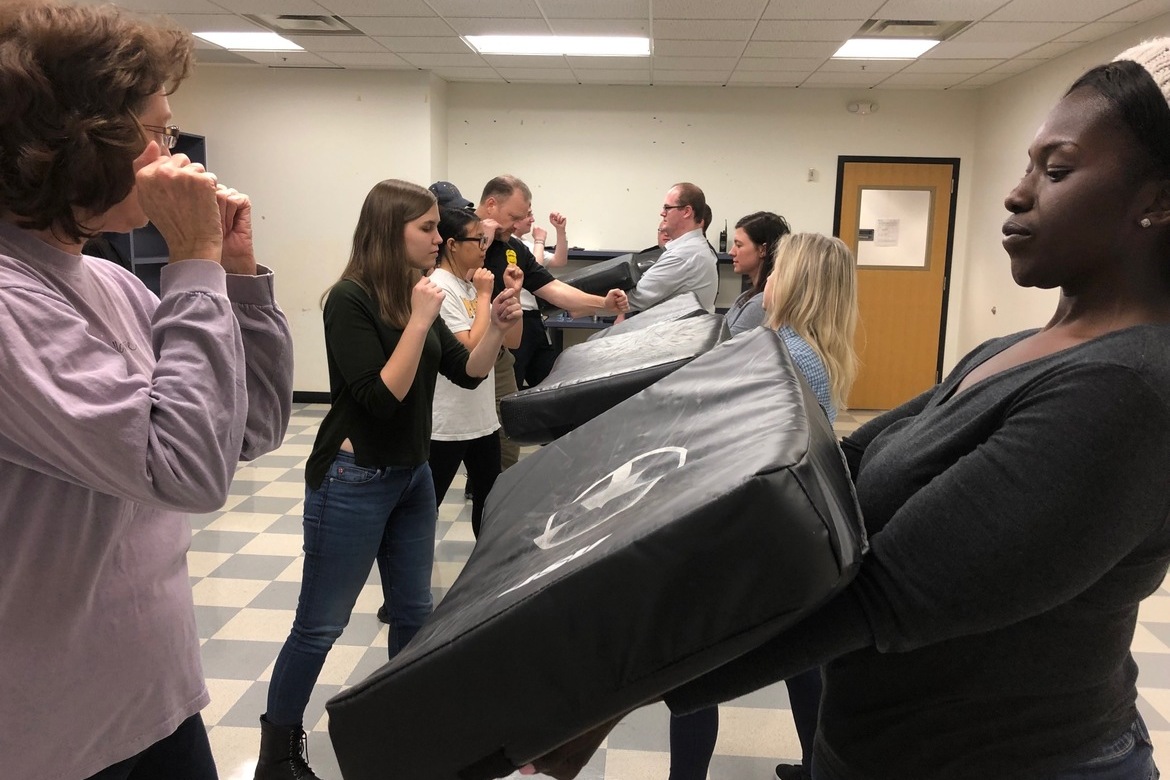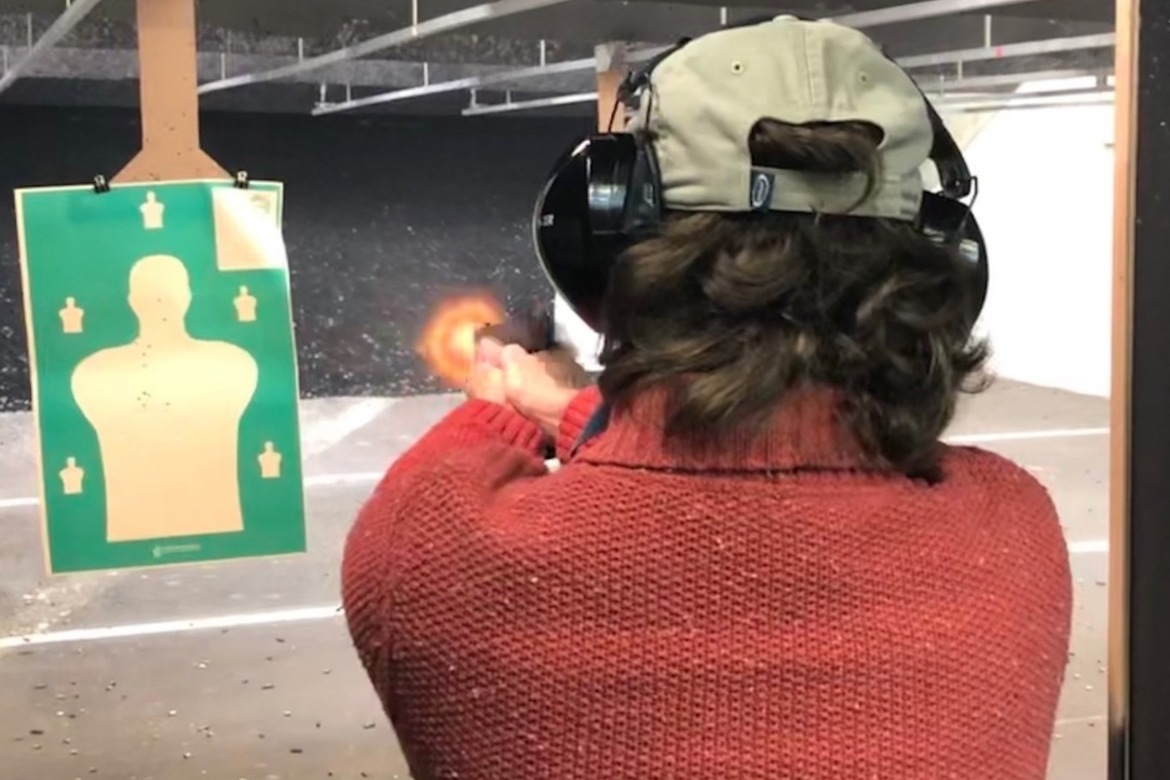
April 9, 2019
The academy recently graduated its third class of participants interested in learning more about EPD and the officers that serve and protect the Emory community.
By Stephanie A. Reid, Contributing Writer, Campus Life
One evening this spring semester, a small meeting room at Emory Police Department (EPD) headquarters became a temporary courtroom of sorts for DeKalb County Magistrate Judge Juwayn Haddad.
A single item was on “the docket” that night –– a presentation on the Georgia judicial system, which Haddad got underway by clicking a projector remote control instead of banging a gavel.
“Good evening. I’m Judge Haddad,” he introduced himself to the dozen so Emory students, staff, faculty, and others in attendance before delivering an overview of court procedures.
Welcome to the EPD Community Police Academy.
 Academy participants receive self-defense instruction. Photo by EPD Officer Christian Theis.
Academy participants receive self-defense instruction. Photo by EPD Officer Christian Theis.
“Often, members of our community do not know the extent of what we do,” said Sgt. J. Ryan Andrews with EPD’s Office of Professional Standards. “So, the academy lets them take a deeper dive into our police department and get to know us personally.”
The seven-week program’s larger goal is to strengthen EPD’s relationship with the Emory campus community and expand its outreach, two things Chief Rus Drew has encouraged since his arrival in 2016. The academy is a decided departure from the self-defense classes, Coffee with a Cop, and other EPD community engagement activities.
The program is open to any member of the Emory community and mirrors similar programs offered at Duke, Georgia Tech, and other peer institutions. Classes meet for two hours on Tuesdays and cover a wide-range of topics, beginning with an overview of the department and ending with firearms safety training that involves a trip to the nearby Quickshot Shooting Range for target practice.
Wedged between are the Haddad-led session on court procedures plus one defensive tactics and another one on criminal investigation taught by an EPD investigator during which participants experience a mock crime scene that requires them to collect evidence in an effort to solve the crime.
“It’s a very fun class,” said Andrews. “The first class probably started with five participants, then we went to seven last fall, and hit 11 this semester.”
EPD, which relies on social media and word-of-mouth advertising for the program, seeks to limit the number of participants to 15 per session.
“We’ve had a decent amount of student participation, which is a good thing,” said Andrews. “The staff is really enjoying this class mostly. We’ve also had some people from the community who follow us on social media to enroll as well.”

Photo by EPD Officer Christian Theis.
Michael Leo Owens, a political science professor, is using what he learned in the academy in teaching his course, “Policing, Imprisonment, and Politics.”
“From the historic and contemporary controversies of lethal use of force to the quotidian matters of pedestrian and driver stops to the use of emergency call systems as civic participation, the academy enhanced my knowledge and ability to help my students formulate more and better balanced views of police and policing,” said Owens, a member of the 2019 fall cohort. “It made the course more interesting and meaningful.”
An interest in disaster relief is what led Sara Springle, a sophomore political science major, to join this semester’s academy cohort.
“Disaster relief generally involves a lot of interaction with law enforcement,” Springle explained. “I thought it would be interesting to learn how a police department functions day-to-day. It’s been really good.”
Freshman Garrett Canterbury said attending the academy last fall gave him the additional insight into EPD operations and policing on a college campus that he needs to do a better job as a student ambassador for the department, particularly in responding to questions from his peers.
Elizabeth Cox, director of Residence Life, has become one of the academy’s biggest fans after attending the fall 2018 session. Shooting a firearm for the first time during firearm safety class, she explained, was both “scary and thrilling.”
“My academy experience reminded me of all the things the Emory police do behind the scenes on our behalf,” added Cox, who interacts with EPD frequently as a member of Campus Life’s on-call staff. “We are lucky to have a group of officers so dedicated to the safety of our students and our entire university community.”
The Emory Police Department (EPD) is part of the Department of Public Safety, a unit of Campus Services. Public Safety provides administrative oversight for EPD, Emory Fire Safety, and Emory Emergency Medical Service, delivering safety and security services to the Emory community. EPD provides complete law enforcement services for the Emory Campus, Midtown Campus, and Oxford College Campus. (http://www.campserv.emory.edu/public-safety/about/index.html)
Learn More
Division of Public Safety, Campus Services
Emory Police Department, Division of Public Safety
EPD Community Relations
http://www.campserv.emory.edu/public-safety/police/services/community-relations-programs.html